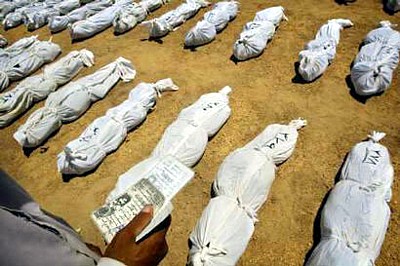Perspective: The Face of Brutality

It was one of the most audacious operations, although not a single shot was fired. On the morning of Nov. 14, dozens of men wearing police commando uniforms pulled up in a fleet of pickup trucks at a building belonging to Iraq's Ministry of Higher Education. They fanned out across the four floors and herded everybody--staff and visitors--into a single room. All of them were ordered to hand over their cell phones. Then the women were taken into another room and locked in. About 150 men were marched outside, bundled into the pickup trucks and driven away. The whole operation took just 15 minutes.
When word of the kidnappings reached the control room of the Ministry of the Interior, an officer on duty there suspected immediately that the perps were acting on the orders of a fearsome Shi'ite militia warlord whose deeds the officer had been tracking for three years. "A ministry of mainly Sunni staff, 150 people taken captive--it can only be one thing," he says. "It had to be the work of Abu Deraa."
Few Americans have ever heard of him, and most Iraqis don't know what he looks like. But such is the reputation of Abu Deraa, 48, that all of Baghdad's biggest, most brazen attacks against Sunni targets are almost automatically assumed to be his handiwork. Iraqi and U.S. officials say Abu Deraa is the mastermind behind the killing of thousands of Sunnis this year. Loosely affiliated with the Mahdi Army of the radical cleric Muqtada al-Sadr, Abu Deraa's death squad is suspected of involvement in some of the most daring kidnappings in the capital--including the Oct. 23 snatch of the U.S. soldier Ahmed Qusai al-Taie and the Nov. 14 raid on the Ministry of Higher Education. (Although more than half of the 150 abductees were released, many remain unaccounted for.) Abu Deraa has a personal fondness for gruesome torture. One of his signature techniques is running a drill into the skull of his live victim. His appetite for mayhem is so vast that Iraqis call him the "Shi'ite Zarqawi"; and like the al-Qaeda-in-Iraq leader, who was killed by a U.S. air strike last June, Abu Deraa has largely operated in the shadows, avoiding public appearances and almost never giving interviews.
Read the rest at Time

<< Home